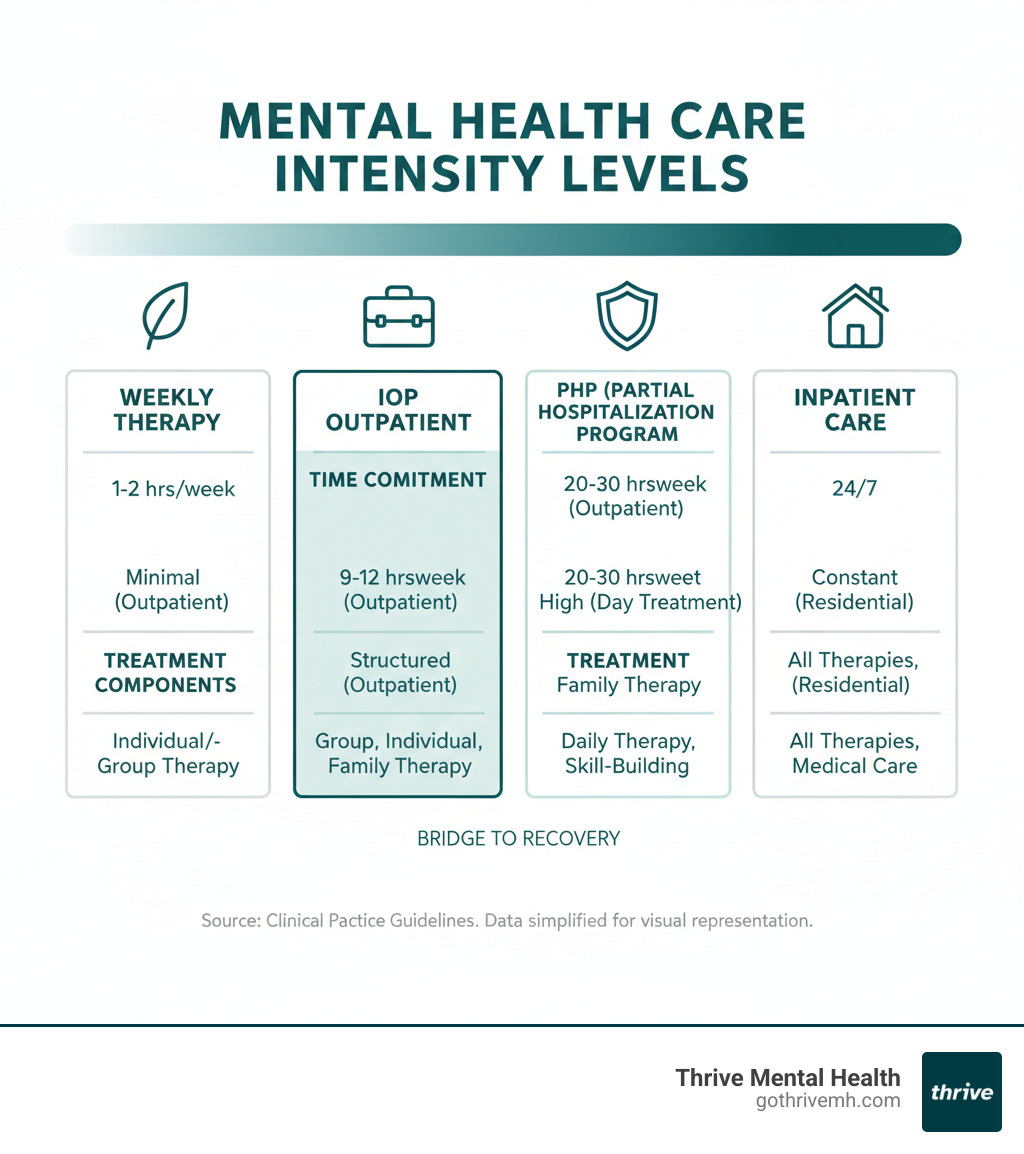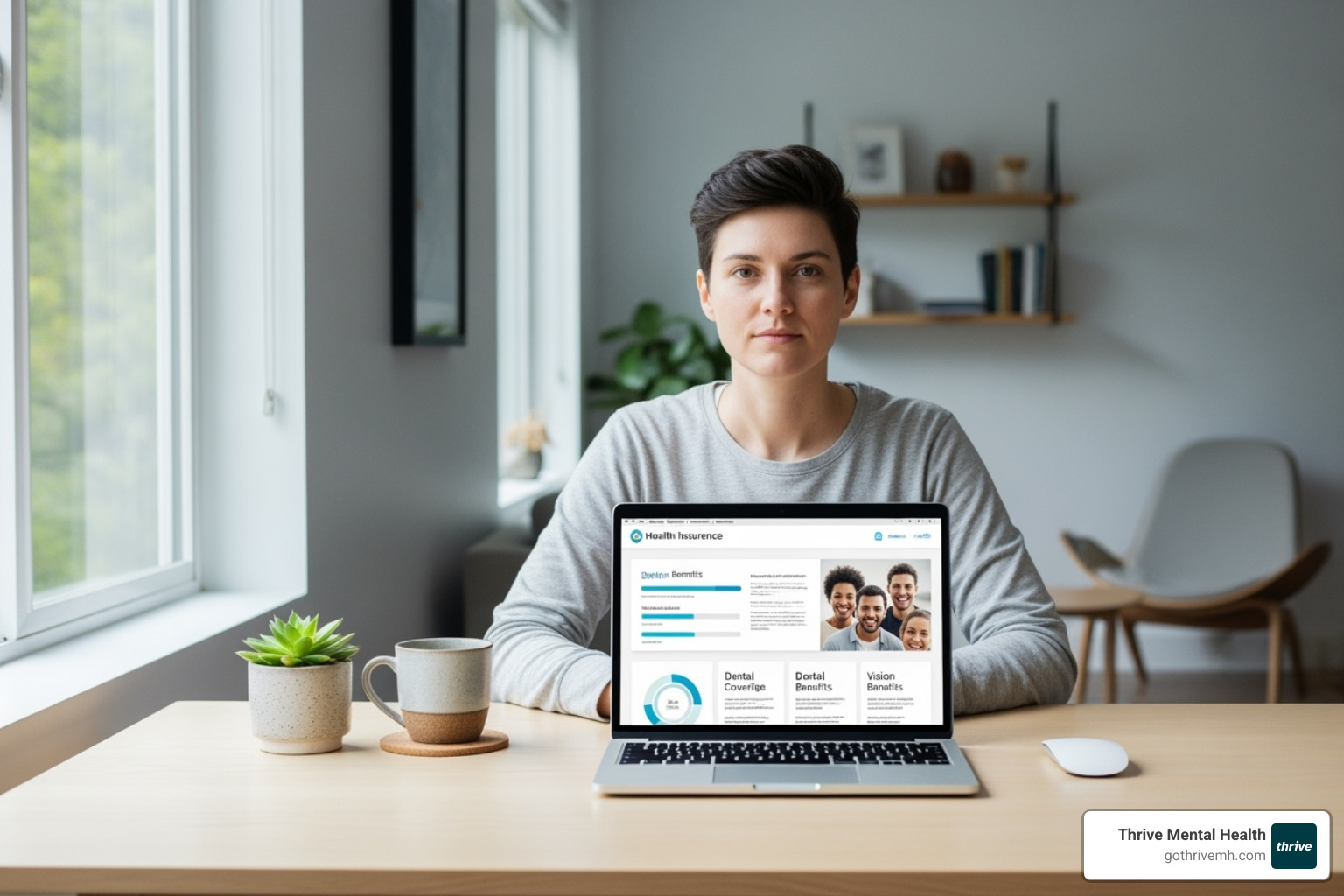Outpatient IOP: Navigating Your Path to Recovery

IOP Outpatient: Your 2025 Recovery Guide
Understanding IOP Outpatient Programs: Your Bridge to Recovery
IOP outpatient programs offer a structured, flexible path to recovery that fits between weekly therapy and inpatient care. They provide intensive support for challenges like anxiety and depression while allowing you to maintain daily responsibilities.
Quick Answer: What is IOP Outpatient?
- Structure: 9-12 hours of treatment per week, typically 3-5 days
- Duration: Usually 9-12 weeks
- Format: Group therapy, individual sessions, and family involvement
- Flexibility: Evening and virtual options available
- Who it helps: Those needing more than weekly therapy but not 24/7 care
An IOP outpatient program is designed for individuals who require intensive therapeutic support but don’t need round-the-clock supervision. These programs condense what could be years of traditional therapy into a focused treatment period, making them valuable for professionals who need rapid symptom relief without pausing their careers.
The key benefit of IOP outpatient care is its real-world application. You practice new coping skills in your actual work and home environments, ensuring therapeutic progress translates directly into your everyday life.
As Anna Green, LMHC, LPC, founder of Thrive Mental Health, I’ve seen how IOP outpatient programs transform lives by blending evidence-based care with the flexibility working professionals in Florida need. The right IOP outpatient approach makes high-quality mental health care both accessible and sustainable.

Key terms for iop outpatient:
What is an Intensive Outpatient Program (IOP)?
An Intensive Outpatient Program (IOP) provides structured mental health and substance use support without an overnight stay. It delivers intensive care while you live at home, maintaining your daily life. IOPs are designed for rapid progress, helping you develop real-world coping skills for conditions like depression, anxiety, and trauma. Research shows they can be as effective as inpatient treatment for many disorders.
Where IOP Fits in the Continuum of Care
Understanding where an IOP outpatient program fits in your mental health journey is key. It serves as a vital bridge, offering more support than weekly therapy but less intensive supervision than inpatient treatment.
-
As a step-up from traditional therapy, an IOP is ideal when weekly sessions aren’t enough. If your symptoms are worsening, an IOP outpatient program provides a more immersive therapeutic experience.
-
As a step-down from higher levels of care, IOPs help you transition from inpatient or partial hospitalization programs, solidifying your skills as you reintegrate into daily life.
-
As an alternative to inpatient care, an IOP is an excellent starting point if you need comprehensive care but not 24/7 supervision, allowing you to maintain work and family commitments.
At Thrive Mental Health, our virtual IOP and hybrid options in Florida empower you to heal on your terms, building skills for long-term recovery.
The Structure of an IOP Outpatient Program
An IOP outpatient program is designed to be intensive enough for real change but flexible enough for real life. It balances the help you need with the responsibilities you have.
Typical Schedule
A typical IOP outpatient program involves 9 to 12 hours of treatment per week, spread across 3 to 5 days. The entire program usually lasts 9 to 12 weeks, condensing years of potential weekly therapy into a focused period for rapid progress.
Session Types
An effective IOP outpatient program combines several therapeutic formats:
- Group therapy is the core of most IOPs, creating a powerful, supportive environment where you can connect with peers who understand your struggles.
- Individual therapy provides essential one-on-one time with your therapist to dig into personal challenges and develop customized coping strategies.
- Family sessions are often included to improve communication and build a stronger support network at home, a key predictor of long-term success.
Flexible Options
Modern IOP outpatient programs are built for convenience:
- Our Virtual IOP offers high-quality care at home, removing geographical and travel barriers for residents across Florida.
- Evening programs allow working professionals and students to attend treatment without disrupting their careers or education.
- Hybrid models blend in-person and virtual sessions for maximum flexibility.
Personalized Care
Quality IOP outpatient programs are not one-size-fits-all. At Thrive Mental Health, we create a personalized treatment plan that integrates with your life. We match you to a group based on your specific challenges and age, ensuring the program addresses your unique needs while respecting your work, school, and family commitments.
Therapeutic Approaches Used in IOPs

An effective IOP outpatient program uses a combination of proven, evidence-based therapies custom to your needs. At Thrive, our clinicians are skilled in a variety of approaches to create a personalized healing experience.
Evidence-Based Therapies
Our therapeutic toolkit includes:
- Cognitive Behavioral Therapy (CBT): Helps you identify and change negative thought patterns that contribute to difficult feelings.
- Dialectical Behavior Therapy (DBT) skills: Teaches practical skills for mindfulness, distress tolerance, emotion regulation, and interpersonal effectiveness.
- Trauma-Informed Therapies: We use specialized approaches like Accelerated Resolution Therapy (ART) and Eye Movement Desensitization and Reprocessing (EMDR) to help process difficult memories.
- Acceptance and Commitment Therapy (ACT): Teaches you to accept difficult thoughts and feelings while committing to actions aligned with your values.
- Mindfulness-Based Relapse Prevention (MBRP): Combines mindfulness with practical strategies to prevent relapse for those in recovery from substance use.
These therapies are delivered through a combination of group, individual, and family sessions to provide comprehensive support. For specialized needs, we may also integrate pain management strategies or innovative approaches like ketamine-assisted therapy where clinically appropriate.
Our goal is to equip you with practical skills that translate directly into your daily life. To see how these therapies work in practice, learn more about IOP treatment at Thrive.
Conditions Treated by IOPs
IOP outpatient programs are versatile and effective for a wide range of mental health challenges, especially when weekly therapy isn’t providing enough support. They are designed to treat complex, often overlapping conditions.
Common conditions treated in IOPs include:
- Depression: For persistent sadness or major depressive episodes that interfere with daily functioning.
- Anxiety Disorders: Including generalized anxiety, panic attacks, and social anxiety that impact work and personal life.
- Trauma and PTSD: Using specialized therapies to address past events that affect your present.
- Substance Use Disorders: Providing structure, accountability, and tools for sustainable recovery from alcohol or drug use.
- Bipolar Disorder: Teaching mood regulation skills and helping to recognize early warning signs of an episode.
- Eating Disorders: Applying skills in a real-world setting to build a healthier relationship with food.
- Self-Harm and Suicidal Ideation: Providing immediate, intensive support and crisis-planning tools in a safe environment.
If you’re in crisis, call/text 988 right now. You are not alone.
IOPs also effectively treat obsessive-compulsive disorder (OCD), other mood disorders, and personality disorders. The comprehensive approach addresses all aspects of your mental health together, not in isolation.
Who is a Good Candidate for an IOP? [Self-Assessment]

Deciding if an IOP outpatient program is right for you is about recognizing when you need a higher level of support. If weekly therapy isn’t enough, an IOP could be the next step.
Signs You May Benefit from an IOP
Consider an IOP outpatient program if you are:
- Finding weekly therapy insufficient: You need more support between sessions to apply coping skills.
- Experiencing worsening symptoms: Despite regular therapy, your anxiety, depression, or substance use is increasing.
- Struggling with daily functioning: Mental health challenges are making it hard to work, maintain relationships, or care for yourself.
- Transitioning from a higher level of care: An IOP can serve as a crucial step-down from a hospital or residential program.
- Needing more structure and accountability: You require consistent check-ins to stay on track with your recovery goals.
- Managing co-occurring conditions: You’re dealing with multiple issues, like depression and substance use, that need an integrated approach.
The ideal candidate for an IOP outpatient program is medically stable, has a supportive home environment, and is ready to engage in intensive therapy but can safely manage their time between sessions.
IOP vs. Other Levels of Care
Navigating mental health care options can be confusing. An IOP outpatient program offers a middle ground, providing more support than weekly therapy but more flexibility than inpatient care.
Comparing Levels of Mental Health Treatment
| Level of Care | Time Commitment (Approx.) | Supervision Level | Daily Life Integration | Cost (Relative) |
|---|---|---|---|---|
| Weekly Therapy | 1 hour/week | Minimal clinical supervision | Fully integrated | Low |
| IOP Outpatient | 9-19 hours/week (adults), 6-19 (adolescents) | Moderate clinical supervision, daily check-ins | High (live at home, maintain work/school) | Moderate |
| Partial Hospitalization Program (PHP) | 25+ hours/week, 4-6 hours/day, 5-7 days/week | High clinical supervision, daily structure | Moderate (return home evenings, but full days in program) | High |
| Inpatient Care | 24/7 | Constant medical & clinical supervision, residential stay | Minimal (removed from daily environment) | Very High |
The key advantage of an IOP outpatient program is its balance of intensive therapy with real-life integration. You get significant support while still living at home and maintaining your responsibilities.
Partial Hospitalization Program (PHP)
A Partial Hospitalization Program (PHP) is a step up from IOP, requiring a full-time commitment of 25+ hours per week. It’s suited for those with more severe symptoms who need daily monitoring but can safely return home at night. Many people step down from PHP to an IOP as they stabilize.
Choosing the Right Level
Deciding on the right level of care depends on several factors:
- Symptom Severity: IOP is ideal for significant symptoms that don’t require 24/7 supervision.
- Support System: A stable home environment is beneficial for IOP success.
- Life Circumstances: IOP is designed for those who need to maintain work, school, or family commitments.
- Treatment History: IOP is a logical next step if weekly therapy isn’t enough or as a step-down from inpatient care.
Our clinical team will help you assess these factors to find the best fit for your needs at our Florida locations.
Populations That Benefit from an IOP Outpatient Program
The flexibility of IOP outpatient programs makes them an effective solution for a wide range of people who need intensive support without pausing their lives. Key populations that benefit include:
- Adults managing complex life responsibilities alongside mental health challenges.
- Young professionals who need to address issues like burnout or anxiety without derailing their careers. Evening and virtual sessions are ideal for this group.
- Students who require intensive support but must maintain their academic schedules and coursework.
- Individuals needing to maintain work or school commitments, as the IOP model is specifically designed to accommodate these responsibilities.
- People with stable home environments who can practice new skills in a supportive setting after daily sessions.
At Thrive Mental Health, we specialize in providing IOP outpatient care for these populations across Florida. With convenient in-person locations and a robust Virtual IOP program for Florida residents, we make it easier for you to access high-quality, intensive support that fits your life.
The Benefits of Choosing an IOP Outpatient Program
IOP outpatient programs offer a unique combination of benefits that make them a powerful choice for recovery.
- Flexibility: You can continue living at home, working, and caring for your family. Evening and virtual options ensure treatment fits your schedule, not the other way around.
- Real-World Application: You immediately practice new coping skills in your daily environment, which helps make them last.
- Structured Support and Community: Regular group sessions provide connection with peers who understand your journey, while individual therapy offers personalized guidance.
- Cost-Effectiveness: IOPs provide comprehensive, evidence-based treatment at a significantly lower cost than residential or inpatient care.
Research confirms that IOP outpatient programs are highly effective. Studies show they deliver outcomes comparable to inpatient treatment for reducing substance use and improving mental health symptoms like depression and PTSD, all while allowing people to maintain their daily lives. You can review some of the research on IOP effectiveness here.
Navigating Logistics: Cost, Insurance, and Enrollment

Navigating the logistics of starting an IOP outpatient program can feel like a barrier, but we’ve streamlined the process to make it as simple as possible.
Understanding Costs and Insurance Coverage
The cost of an IOP outpatient program varies based on your specific needs and insurance plan. IOPs are a significantly more affordable option than inpatient care.
- Insurance Verification: We make it easy. You can verify your insurance with Thrive in about two minutes to get a clear picture of your benefits.
- Accepted Providers in Florida: We are in-network with major insurance providers across Florida, including Cigna, Optum, and Florida Blue, to maximize your coverage.
- Florida-Focused Support: Our team specializes in helping Florida residents navigate their insurance benefits for both in-person and virtual programs, ensuring a clear and transparent process.
How to Find and Enroll in an IOP Program
Our enrollment process is straightforward and supportive:
- Inquire: Explore our programs online or call our admissions team for a no-pressure conversation.
- Assessment: Participate in a confidential assessment call with a licensed professional to discuss your goals and create a personalized treatment plan.
- Benefits Check: Our team will verify your insurance benefits and explain your coverage clearly, so there are no financial surprises.
- Admission: Once you’re ready, we’ll guide you through a smooth admission and orientation process.
The entire process, from your first call to your first session, can take just a few days. To explore options at our Florida locations, visit our guide to finding intensive outpatient programs near you.
Frequently Asked Questions about IOP Outpatient Programs
When considering an IOP outpatient program, it’s natural to have questions. Here are answers to some of the most common ones we hear.
{
"@context": "https://schema.org",
"@type": "FAQPage",
"mainEntity": [
{
"@type": "Question",
"name": "What is the main goal of an IOP outpatient program?",
"acceptedAnswer": {
"@type": "Answer",
"text": "The main goal of an IOP outpatient program is to provide intensive, structured therapy that helps stabilize symptoms, teach coping skills, and improve daily functioning, all while allowing you to live at home."
}
},
{
"@type": "Question",
"name": "How many hours a week is an IOP?",
"acceptedAnswer": {
"@type": "Answer",
"text": "Most IOP outpatient programs involve 9 to 12 hours of treatment per week, typically spread over 3 to 5 days."
}
},
{
"@type": "Question",
"name": "Can you work or go to school while in an IOP?",
"acceptedAnswer": {
"@type": "Answer",
"text": "Yes. IOP outpatient programs are designed to be flexible, with evening and virtual options so you can maintain work, school, or family responsibilities."
}
},
{
"@type": "Question",
"name": "Does insurance cover IOP outpatient programs?",
"acceptedAnswer": {
"@type": "Answer",
"text": "Yes, many insurance plans cover IOP. In Florida, we are in-network with major providers like Cigna, Optum, and Florida Blue. Thrive can help you verify your benefits quickly."
}
},
{
"@type": "Question",
"name": "How do I start an IOP outpatient program?",
"acceptedAnswer": {
"@type": "Answer",
"text": "Start by contacting Thrive for a confidential assessment and insurance verification. Our team will guide you through enrollment and orientation."
}
}
]
}
What is the main goal of an IOP outpatient program?
The main goal is to provide intensive, structured therapy to stabilize symptoms, teach coping skills, and improve daily functioning while you live at home.
How many hours a week is an IOP?
Most programs involve 9 to 12 hours of treatment per week, spread over 3 to 5 days.
Can you work or go to school while in an IOP?
Yes. IOPs are designed with flexibility, including evening and virtual IOP options, to accommodate work and school schedules.
Does insurance cover IOP outpatient programs?
Yes, many insurance plans cover IOP. In Florida, we are in-network with major providers like Cigna, Optum, and Florida Blue. We can help you verify your insurance to understand your specific benefits.
How do I start an IOP outpatient program?
The first step is to contact Thrive for a confidential assessment. Our team will then guide you through insurance verification and enrollment.
Your Path Forward with Intensive Outpatient Care
Your path to better mental health is within reach. An IOP outpatient program can be the bridge from where you are to where you want to be, offering intensive support that fits into your real life.
These programs provide structured, flexible care that allows you to heal without putting your responsibilities on hold. At Thrive Mental Health, our virtual and in-person IOP/PHP programs across Florida, including evening sessions, are designed to help you build lasting skills for recovery. An IOP outpatient program doesn’t just help you get through a crisis—it helps you reclaim your life.
To learn more about the daily structure, read What to Expect in an Intensive Outpatient Program. If you need a higher level of support, you can also Learn more about PHP at Thrive.
Ready for support in Florida? Thrive offers virtual and hybrid IOP/PHP with evening options. Verify your insurance in 2 minutes (no obligation) → Start benefits check or call 561-203-6085. If you’re in crisis, call/text 988.